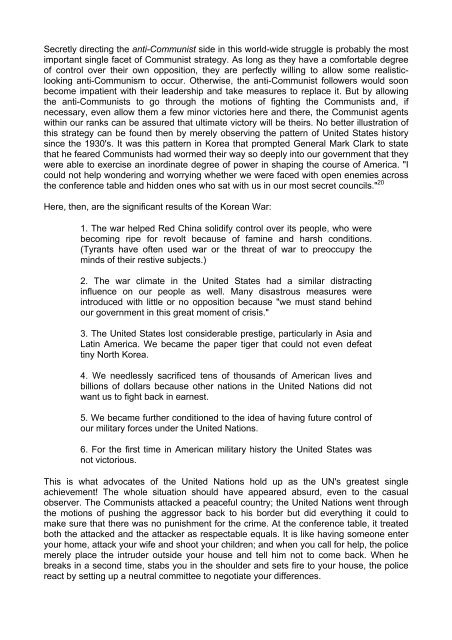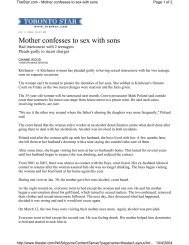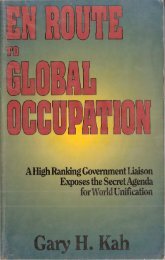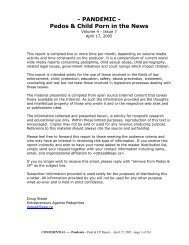G. Edward Griffin - The Fearful Master - PDF Archive
G. Edward Griffin - The Fearful Master - PDF Archive
G. Edward Griffin - The Fearful Master - PDF Archive
Create successful ePaper yourself
Turn your PDF publications into a flip-book with our unique Google optimized e-Paper software.
Secretly directing the anti-Communist side in this world-wide struggle is probably the most<br />
important single facet of Communist strategy. As long as they have a comfortable degree<br />
of control over their own opposition, they are perfectly willing to allow some realisticlooking<br />
anti-Communism to occur. Otherwise, the anti-Communist followers would soon<br />
become impatient with their leadership and take measures to replace it. But by allowing<br />
the anti-Communists to go through the motions of fighting the Communists and, if<br />
necessary, even allow them a few minor victories here and there, the Communist agents<br />
within our ranks can be assured that ultimate victory will be theirs. No better illustration of<br />
this strategy can be found then by merely observing the pattern of United States history<br />
since the 1930's. It was this pattern in Korea that prompted General Mark Clark to state<br />
that he feared Communists had wormed their way so deeply into our government that they<br />
were able to exercise an inordinate degree of power in shaping the course of America. "I<br />
could not help wondering and worrying whether we were faced with open enemies across<br />
the conference table and hidden ones who sat with us in our most secret councils." 20<br />
Here, then, are the significant results of the Korean War:<br />
1. <strong>The</strong> war helped Red China solidify control over its people, who were<br />
becoming ripe for revolt because of famine and harsh conditions.<br />
(Tyrants have often used war or the threat of war to preoccupy the<br />
minds of their restive subjects.)<br />
2. <strong>The</strong> war climate in the United States had a similar distracting<br />
influence on our people as well. Many disastrous measures were<br />
introduced with little or no opposition because "we must stand behind<br />
our government in this great moment of crisis."<br />
3. <strong>The</strong> United States lost considerable prestige, particularly in Asia and<br />
Latin America. We became the paper tiger that could not even defeat<br />
tiny North Korea.<br />
4. We needlessly sacrificed tens of thousands of American lives and<br />
billions of dollars because other nations in the United Nations did not<br />
want us to fight back in earnest.<br />
5. We became further conditioned to the idea of having future control of<br />
our military forces under the United Nations.<br />
6. For the first time in American military history the United States was<br />
not victorious.<br />
This is what advocates of the United Nations hold up as the UN's greatest single<br />
achievement! <strong>The</strong> whole situation should have appeared absurd, even to the casual<br />
observer. <strong>The</strong> Communists attacked a peaceful country; the United Nations went through<br />
the motions of pushing the aggressor back to his border but did everything it could to<br />
make sure that there was no punishment for the crime. At the conference table, it treated<br />
both the attacked and the attacker as respectable equals. It is like having someone enter<br />
your home, attack your wife and shoot your children; and when you call for help, the police<br />
merely place the intruder outside your house and tell him not to come back. When he<br />
breaks in a second time, stabs you in the shoulder and sets fire to your house, the police<br />
react by setting up a neutral committee to negotiate your differences.



![Robert T McQuaid [rtmq@stn.net] Sent: Friday, October 29, 2004 12 ...](https://img.yumpu.com/51070071/1/190x245/robert-t-mcquaid-rtmqstnnet-sent-friday-october-29-2004-12-.jpg?quality=85)







